See also
| This disambiguation page lists articles associated with the title Battle of the Nile. If an internal link led you here, you may wish to change the link to point directly to the intended article. |
Battle of the Nile was a victory by Nelson in 1798.
Battle of the Nile may also refer to:
| This disambiguation page lists articles associated with the title Battle of the Nile. If an internal link led you here, you may wish to change the link to point directly to the intended article. |
This article concerns the period 459 BC – 450 BC.

Ptolemy XIII Theos Philopator was one of the last members of the Ptolemaic dynasty of Egypt. He was the son of Ptolemy XII and the brother of and co-ruler with Cleopatra VII. Cleopatra's exit from Egypt caused a civil war to break out between the pharaohs. Ptolemy later ruled jointly with his other sister, Arsinoe IV.

Artaxerxes II Mnemon was the King of Kings of Persia from 404 BC until his death in 358 BC. He was a son of Darius II and Parysatis.

The history of ancient Egypt spans the period from the early prehistoric settlements of the northern Nile valley to the Roman conquest of Egypt in 30 BC. The pharaonic period, the period in which Egypt was ruled by a pharaoh, is dated from the 32nd century BC, when Upper and Lower Egypt were unified, until the country fell under Macedonian rule in 332 BC.

Psamtik II was a king of the Saite-based Twenty-sixth dynasty of Egypt. His prenomen, Nefer-Ib-Re, means "Beautiful [is the] Heart [of] Re." He was the son of Necho II.

Arsinoë IV was the fourth of six children and the youngest daughter of Ptolemy XII Auletes. Queen and co-ruler of Ptolemaic Egypt with her brother Ptolemy XIII from 48 BC – 47 BC, she was one of the last members of the Ptolemaic dynasty of ancient Egypt. Arsinoë IV was also the half sister of Cleopatra VII. For her role in conducting the Siege of Alexandria against her sister Cleopatra, Arsinoë was taken as a prisoner of war to Rome by the Roman triumvir Julius Caesar following the defeat of Ptolemy XIII in the Battle of the Nile. Arsinoë was then exiled to the Temple of Artemis at Ephesus in Roman Anatolia, but she was executed there by orders of triumvir Mark Antony in 41 BC at the behest of his lover Cleopatra.
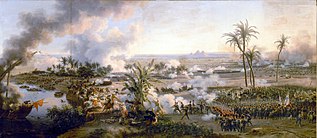
The Battle of the Pyramids, also known as the Battle of Embabeh, was a major engagement fought on 21 July 1798 during the French Invasion of Egypt. The French army, under Napoleon Bonaparte, scored a decisive victory against the forces of the local Mamluk rulers, wiping out almost the entire Ottoman army located in Egypt. It was the battle where Napoleon employed one of his significant contributions to military tactics, the divisional square. Actually a rectangle, the deployment of the French brigades into these massive formations repeatedly threw back multiple cavalry charges by the Mamluks.
Ancient warfare is war that was conducted from the beginning of recorded history to the end of the ancient period. In Europe and the Near East, the end of antiquity is often equated with the Fall of Rome in 476 AD, the wars of the Eastern Roman Empire on its Southwestern Asian and North African borders, and the beginnings of the Muslim conquests in the 7th century. In China, it can also be seen as ending of the growing role of mounted warriors needed to counter the ever-growing threat from the north in the 5th century and the beginning of the Tang dynasty in 618 AD. In India, the ancient period ends with the decline of the Gupta Empire and the beginning of the Muslim conquests there from the 8th century. In Japan, the ancient period is considered to end with the rise of feudalism in the Kamakura period in the 12–13th century.
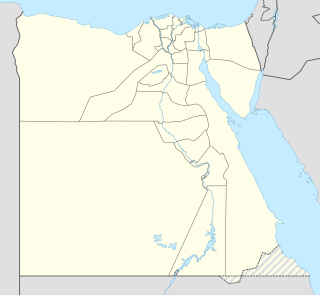
Pelusium was an important city in the eastern extremes of Egypt's Nile Delta, 30 km to the southeast of the modern Port Said. It became a Roman provincial capital and Metropolitan archbishopric and remained a multiple Catholic titular see.
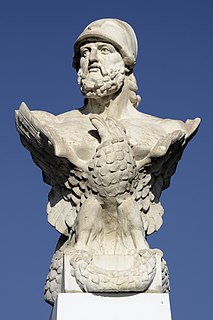
Cimon or Kimon was an Athenian statesman and general in mid-5th century BC Greece. He was the son of Miltiades, the victor of the Battle of Marathon. Cimon played a key role in creating the powerful Athenian maritime empire following the failure of the Persian invasion of Greece by Xerxes I in 480–479 BC. Cimon became a celebrated military hero and was elected to the rank of strategos after fighting in the Battle of Salamis.
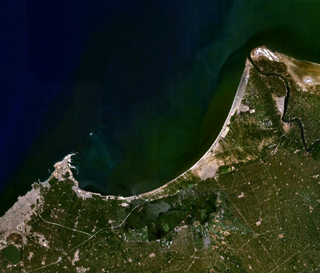
The Abū Qīr Bay is a spacious bay on the Mediterranean Sea near Alexandria in Egypt, lying between the Rosetta mouth of the Nile and the town of Abu Qir. The ancient cities of Canopus, Heracleion and Menouthis lie submerged beneath the waters of the bay. In 1798 it was the site of the Battle of the Nile, a naval battle fought between the British Royal Navy and the Navy of the French First Republic. The bay contains a natural gas field, discovered in the 1970s.

The Ptolemaic Kingdom was an ancient Hellenistic state based in Egypt. It was founded in 305 BC by Ptolemy I Soter, a companion of Alexander the Great, and lasted until the death of Cleopatra in 30 BC. Ruling for nearly three centuries, the Ptolemies were the longest and final dynasty in ancient Egyptian history.

The Kingdom of Kush was an ancient kingdom in Nubia, located at the Sudanese and southern Egyptian Nile Valley.
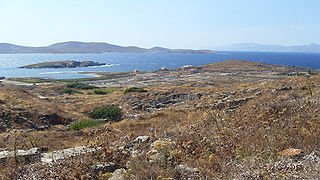
The Wars of the Delian League were a series of campaigns fought between the Delian League of Athens and her allies, and the Achaemenid Empire of Persia. These conflicts represent a continuation of the Greco-Persian Wars, after the Ionian Revolt and the first and second Persian invasions of Greece.

Nile Street in Bath, Somerset, England is a short street of Georgian houses linking Norfolk Crescent and Nelson Place West with the Upper Bristol Road.
Nealkes was an ancient Greek painter from Sicyon who flourished in the 3rd century BC.

The Thirty-first Dynasty of Egypt, also known as the Second Egyptian Satrapy, was effectively a satrapy of the Achaemenid Persian Empire between 343 BC to 332 BC. It was founded by Artaxerxes III, the King of Persia, after his reconquest of Egypt and subsequent crowning as Pharaoh of Egypt, and was disestablished upon the conquest of Egypt by Alexander the Great.

The Battle of Pelusium in 343 was fought between the Persians, with their Greek mercenaries, and the Egyptians with their Greek mercenaries. It took place at the stronghold of Pelusium, on the coast at the far eastern side of the Nile Delta. Overall, Artaxerxes III commanded the Persians, and Nectanebo II commanded the Egyptians. The Greek troops with Egyptians inside the fortress were commanded by Philophron. The first attack was by Theban troops under Lacrates. The battle allowed Persia to conquer Egypt, ending the last period of native rule in Ancient Egypt.